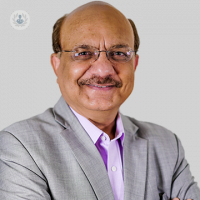Stress management techniques: what works and how to start
Escrito por:The best way to manage stress is to become immune to it – by controlling how you react to the situation you’re in. Stress management techniques have gained huge traction in recent years, with books and apps showing you how to relax your muscles or practice controlled breathing – but what actually works in stress management?
Renowned psychiatrist Dr Kishore Chandiramani explains why some strategies succeed and others fail, and when it could be useful to seek the help of a psychotherapist.
How does stress management work?
Stress management involves controlling our reaction to stressful situations by silencing the mind. By the mind, we mean the judging, thinking, feeling, reacting part of our brain. For many of us, it is constantly on overdrive. Our reactions are so fast that they can feel out of control.
However, underneath this and deep within us exists an inner consciousness that doesn’t get stressed. Some people call it soul, and some people call it equanimous consciousness. This consciousness is equanimous, neutral, and undisturbed. If we learn how to connect with this inner consciousness, then we will not be stressed in a given situation.
What techniques actually work?
There are of course many stress management techniques these days – including progressive muscle relaxation, guided imagery, and breath regulation techniques. They all aim towards the same goal – silencing the mind. However, it’s important to find the right technique for you because not every technique will work for every person.
What makes a technique successful is how you relate to it. If it is just a technique, it won't work, or at the very least it won't work well. However, if it is a way of being, then it will work.
When can a psychotherapist help?
If you are struggling to deal with stress on your own, you might benefit from the help of a psychotherapist who can help you manage the thoughts and emotions you’re experiencing.
The most popular form of therapy for achieving this is cognitive behavioural therapy. This is based on the assumption that it is very difficult to produce emotions on their own – they always follow a thought or behaviour. Therefore it is our thoughts and behaviours that are primary and what we should focus on. By controlling our behaviour and thoughts directly, we indirectly control our emotions.
Cognitive therapy and behavioural therapy used to stand on their own as separate therapies. However, they complement each other very well. Cognitive therapy is a little stronger on the theoretical side, but weaker on the therapy side; whereas behavioural therapy is stronger on the therapy side and weaker on the theoretical side. Combining these therapies into one has resulted in the emergence of one of the most effective therapy techniques currently available.
Ultimately, whether you decide to seek the help of a psychotherapist or try out techniques yourself, learning to control your emotions is one of the most empowering steps you can take. Each of us has this capacity within us already – it’s simply a matter of connecting to it.
Dr Kishore Chandiramani can help you learn to control your reactions to stressful situations and connect to your inner consciousness that doesn't get stressed. Click here to learn more and to get in contact.



